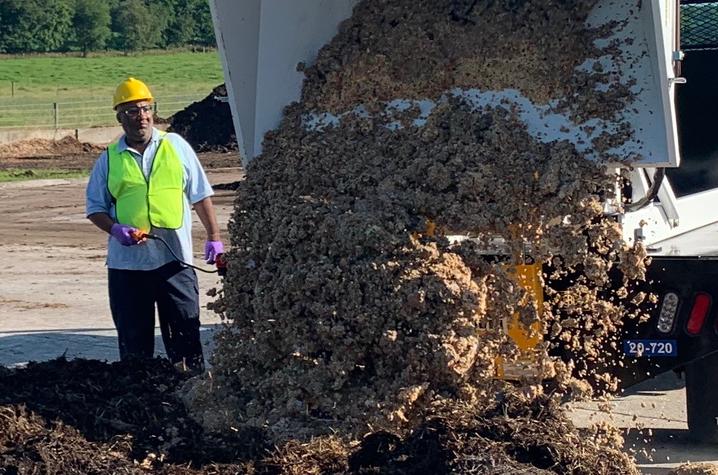UK Diverts More Than 17 Tons of Material With Food Waste Program
LEXINGTON, Ky. (Sept. 26, 2019) — By the end of 2022, the University of Kentucky plans to meet its sustainability objective of diverting — by recycling, composting or reusing — at least as much material as it sends to the landfill.
UK took another important step toward this sustainability goal with the launch of a food waste composting program over the summer. This partnership initiative between UK Dining, UK Recycling, UK Sustainability and the College of Agriculture, Food and Environment (CAFE) is reducing the amount of food waste going into the landfill and producing an organic, nutrient-rich soil amendment for use on the university’s farms and landscaping.
The composting program was launched at Champions Kitchen in June and expanded to include the Fresh Food Company at The 90 at the start of the fall semester. The initiative recently added lemon rinds from Chick-fil-A at the Gatton Student Center to the list of food waste that it is keeping out of the landfill. Additional retail locations may be added to the system in the future.
“This large-scale pilot project is off to a great start and is an impressive example of the power of partnerships on our campus, said Shane Tedder, UK’s sustainability coordinator. "We are spearheading commercial-scale food waste diversion in the Bluegrass Region and it would not be happening without the commitment and creativity of each of the partners involved. We hope that a successful proof of concept on this front can be a building block toward a community-wide food waste diversion program,” .
Food waste and napkins from the two dining locations are "pulped" in the dish rooms to shred and remove about 50% of the moisture. The pulped material is collected in carts that are serviced by UK Recycling staff using a special truck, acquired through funding secured from internal and external grants, that is outfitted with an enclosed, self-dumping container and cart tipper.
The next step is the actual composting which happens at UK’s C. Oran Little Research Center in Woodford County. The food waste is combined with a carbon-rich material like wood chips, grass clipping or animal bedding in a windrow system where soil microbes speed the conversion of these waste materials into a nutrient-rich compost. The finished compost is used as a soil amendment at the UK's Organic Research Farm and by UK Grounds to support crops and landscaping by boosting soil health.
Since June, this new initiative has diverted more than 17 tons of material from the landfill. This diversion of food waste builds on a growing organic material diversion program at the university that already includes green waste (leaves, logs, limbs, prunings, etc.) and untreated wood like shipping pallets and some scrap lumber.
For more information about UK’s organic waste diversion programs, visit: www.uky.edu/facilities/cppd/services/facilities-services/recycling/organics-food-waste-diversion and watch the video above to see the food waste composting program in action.





